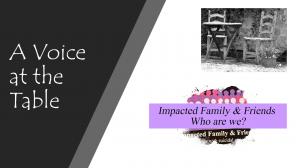Murder-Suicide: The psychology, the trauma, the survivors, the media, the stigma, the methodology & safety
As families, communities, a country, we must shatter the prejudice and judgement and stop avoiding the complexity of murder-suicide. Lives depend on it.”
TAUNTON, MA, US, April 30, 2021 /EINPresswire.com/ -- The United States is still reeling from the trauma of mass shootings. Within that violence were a number of murder-suicides that left too many voices still unheard, too many stories still untold, and too many families buried under neighborhood, community and national prejudice, discrimination and judgement. It’s long passed time to bring this public health issue out of the shadows and shatter that taboo laden silence. Talk saves lives, so let’s talk.— Annemarie Matulis
Annemarie Matulis, Chair of the Impacted Family & Friends Division of the American Association of Suicidology (AAS) and co-founder of a grassroots movement, A Voice at the Table, is accustomed to receiving calls and emails requesting a referral to support resources for families impacted by the suicidal crises of loved ones, suicide attempt survivors themselves, and loss survivors, those bereaved by losing a loved one to suicide. She usually has a wealth of resources on hand to share, unless the issue is a murder-suicide.
“There’s next to nothing, a handful of survivors willing to step out of the shadows, at best, a few online sites. Even within the field of suicide prevention you feel the hush in the room when it’s mentioned,” she noted. “As families, communities, a country, we must shatter the prejudice and judgement and stop avoiding the complexity of murder-suicide. Lives depend on it.”
Matulis reached out to a few friends and colleagues in February with a “call to action.” The result is an 8-part series of webinars and livestreams that weave together a variety of psychology, science and lived experience threads to create a tapestry of voices to expand knowledge related to the complexity of murder-suicide and initiate local, state-wide, and national conversations around this public health issue: the voices still unheard, the stories still untold.
The Voices of the Tapestry
On May 6th, 2021, Dr. Thomas Joiner, the Robert O. Lawton Distinguished Professor in the Department of Psychology at Florida State University (FSU), will kick-off the series with his The Psychology of Murder-Suicide, a 2-hour live webinar. Dr. Joiner has received multiple awards of excellence and has authored or edited eighteen books including Why People Die by Suicide (2005) and The Perversion of Virtue: Understanding Murder-Suicide (2014).
Stephanie Willard is the survivor of a murder-suicide. That statement tends to stop people in their tracks. It has not stopped Stephanie, a mental health advocate and storyteller, from combining her years of alternative care knowledge as a licensed acupuncturist, Oriental Medicine practitioner, and clinical aroma-therapist with her loss experience. Her 2-hour live webinar, Effect on a Family and the Ripples Beyond: A Unique Perspective after a Murder-Suicide, is May 21st. Stephanie has become an activist and advocate with the Oregon Suicide Prevention Alliance working on prevention and legislative changes in addition to her work with both A Voice at the Table and the AAS Impacted Family & Friends Division.
On May 27th, Eric Kussin and Dr Bart Andrews will come to the table with a one-hour livestream to discuss the role of science and a lived experience perspective with media, messaging and truth related to murder-suicide – Why the Media’s Portrayal of Murder-Suicides is Setting the Convo Back: A Conversation. Eric Kussin spent years working in and around professional sports. However, a debilitating mental health crisis stopped Eric’s career and life in its tracks for over two and a half years. He learned healing practices that enabled him to dig out of his abyss, and found a higher calling, launching a non-profit at the end of 2017 called, We’re All a Little “Crazy:” The Global Mental Health Alliance. The Alliance is comprised of athletes and celebrities, along with media members, expert practitioners, advocates, and everyday heroes who’ve come together to make talking about mental health a common topic for “5 out of 5” of us.
Dr. Bart Andrews, a recognized content expert within suicidology, is the Chief Clinical Officer at Behavioral Health Response in Missouri and is dedicated to suicide and crisis intervention. Through BHR, Dr. Andrews created and implemented the first suicide follow-up program in the state of Missouri, and BHR has expanded suicide follow-up care to youth and adults throughout the eastern region of Missouri. Dr. Andrews is a person in recovery, a suicide attempt survivor, and believes that the path to suicide prevention must be framed in the context of relationships, community, and culture. Suicide is a community health problem, and everyone can help.
On June 4th, Dr. Mike Anestis, in a 2-hour webinar, will clarify how and why firearms play a central role in firearm suicide, learning more about how firearms increase the risk for suicide and then what we can do to decrease that risk. Dr. Anestis is the Executive Director of the New Jersey Gun Violence Research Center and an Associate Professor of Urban-Global Public Health at Rutgers University. His research focuses primarily on the role of firearms in suicide, both within the military and among civilians. He has published over 160 peer reviewed scientific articles as well as the book Guns and Suicide: An American Epidemic (2018).
With sensitivity to the uncomfortable impact of this topic, three, one-hour livestreams have been scattered within the series and again at the end to address trauma. Dr. Kathleen carterMartinez is nationally recognized as an expert in trauma, the trauma of suicide, and advocates for mindful, compassionate recovery from personal traumatic events. Her livestreams will be on May 15th, Trauma: The Great Equalizer; June 10th, The Trauma of Suicide: Frozen in Time; and June 24th, Trauma: Fractured Spirits.
Within The Complexity of Murder-Suicide series, there is a special event: A Roundtable Conversation: Kevin Hines is an award-winning brain/mental health and suicide prevention activist, entrepreneur, multiple award-winning filmmaker, best-selling author, international educator and speaker who reaches audiences with his story of an unlikely survival and his strong will to live. On June 7th, Kevin will host a roundtable conversation with all of the series’ “voices” to engage in hoped for takeaways for the audiences and identify areas of action and next steps to tear down the barriers of judgement around murder-suicide and marginalization of the families impacted. We must do better. Suicide prevention is everyone’s business.
For details on how to register for any one or all segments of this series,
http://www.avoiceatthetable.org/tapestryofvoices.html or director@avoiceatthetable.org. To register for the three separate 2-hour webinars: http://www.avoiceatthetable.org/store.html. There is a modest fee for each of the three webinars. There is no cost for the four livestreams. Proceeds after expenses will be donated to A Voice at the Table/Impacted Family & Friends and the American Association of Suicidology.
For the Media: Responsible reporting on suicide, including stories of hope and resilience, can prevent more suicides. Please visit the Suicide Reporting Recommendations for more information. For additional information, please visit SuicideReportingToolkit.com.
About A Voice at the Table: A Voice at the Table was founded in 2014 as a companion to the documentary, A Voice at the Table, a call to action to bring the lived experience voices of suicide attempt survivors to all tables within suicide prevention, intervention and postvention. As a grassroots movement, it has since expanded and become the national "home base" forum for the family & friends emotionally impacted & traumatized by the suicidal experiences of loved ones. A movement: a group of people working together to advance their shared ideas. A forum: a place, meeting or medium where ideas and views on a particular concern can be exchanged, in this case, nationally and internationally. For more information: director@avoiceatthetable.org
Annemarie Matulis
A Voice at the Table
+1 5089227278
email us here
Visit us on social media:
Facebook
Twitter
LinkedIn






